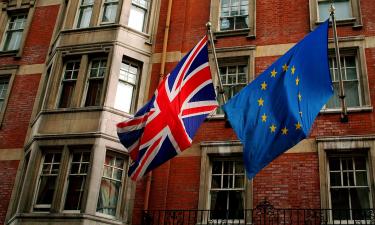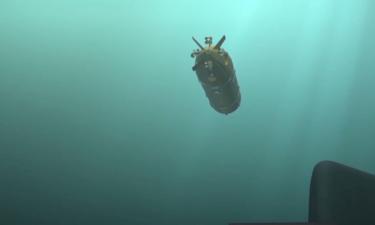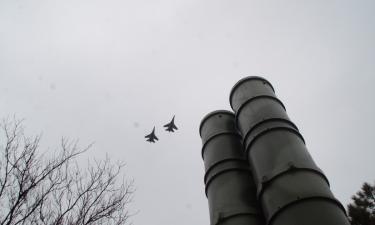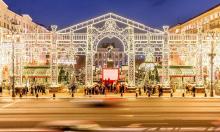New Foreign Policy Year For Russia And The World
 Igor IVANOV, Minister of Foreign Affairs of Russia
Igor IVANOV, Minister of Foreign Affairs of Russia
For over half a century now the new year begins in September for diplomats. The thing is that the UN General Assembly, the key foreign policy forum of the international community, resumes its sessions in the first autumn month. And the guidelines of global development for the next year are outlined in the first days of the autumn session.
Russian diplomacy is more active now that ever before, spreading out to many areas with an unprecedented number of international meetings and contacts. But it is not the intensity of these contacts but their contents that is important. This is why I would like to draw the attention of the readers to the key issues which Russian diplomacy will spotlight in the next foreign policy year.
It will be a busy and rather unusual year. The global community is facing several problems that call for emergency and adequate attention. The main task is to choose a model of world order for the next few years and decades that would meet the interests of all states and nations, big and small.
The recent developments, and above all the Iraqi crisis, poignantly showed that the current transition period of global development from the era of the Cold War to a new world order is taking too long. This has generated excessive tensions in the system of international relations and created an uncertain situation of permanent instability.
I cannot recall another such period in modern history when there would be so many unresolved regional problems in the world threatening the entire system of international security. The problem is compounded by the threats of terrorism, separatism and other forms of extremism, the proliferation of weapons of mass destruction and its delivery vehicles, drug trafficking, and organised crime.
We are coming to see that we cannot simply react to the arising and quite unexpected problems. We need to create a new world order that would guarantee stability and security at the global level, facilitate the neutralisation of existing challenges and preclude the appearance of new ones.
Russia will continue to play an active, initiative role in creating such an order. This activity is prompted by our national interests. It is of vital significance for Russia to create such external conditions that would reliably guarantee security to the state and prosperity to its citizens, and would encourage socio-economic progress of the country.
But we know that we will attain this goal only if Russia elaborates the basic principles that must underlie international relations at the modern stage jointly with other states. The international community can regard the new democratic Russia as a reliable, predictable and responsible partner open to dialogue and the search for mutually acceptable solutions on the basis of the UN Charter and principles of international law.
We firmly believe that the international community can create a democratic world order where each state would bear its share of responsibility for the future of humankind, while the international community would safeguard the pillars of international law and legitimate interests of each member. In other words, our principle is prosperity and security through global interaction and maintenance of national distinction.
We see this also as the main meaning of the concept of multipolarity in the globalisation age. To us, a multipolar world means close cooperation of all states and regions on the basis of equality, democracy and constructive partnership. The developments of the past few years powerfully confirmed that when we - I mean the international community - act jointly, we can solve the most difficult problems. But when we are divided, it is much more difficult to fight modern threats and challenges.
This calls for strengthening multilateral institutes and above all the central and coordinating role of the UN and its Security Council. The UN can become the core structure of international life today, a guarantor of the inviolability of fundamental principles of international law. The UN can become the centre for the elaboration of a global development strategy, provided there is the joint will of the member states. Russia has the will to do this, as proved by the forthcoming attendance by President Vladimir Putin of the UN General Assembly session.
I would like to say in this connection that there are no elements of confrontation or rivalry in Russia's stand in favour of multipolarity and multilateral diplomacy, which is shared by the overwhelming majority of states. On the contrary, we sincerely want to develop close collaboration with all our partners. Moreover, we do not imagine the development of the new world order without such broad collaboration.
This fully concerns our relations with the USA. These days we are preparing energetically for a regular Russia-US summit meeting in Washington, which is to take place in the next few days. We very much hope that the forthcoming talks between the presidents of Russia and the USA will mark a new milestone in constructive partnership between our countries. Global stability and predictability still largely depends on the standards of Russia-US interaction on the world scene.
For our part, we are prepared for such cooperation and have proved this in deed, during the elaboration of the Strategic Offensive Reductions Treaty, or as a party to the international anti-terrorist cooperation, including in Afghanistan. Of course, much is yet to be done through concerted efforts, above all in the area of security. But we should not forget about other areas of cooperation, such as the need to promote trade and economic ties between our countries and remove barriers to the development of citizen contacts.
We are facing no less responsible tasks in the development of a new quality of relations between Russia and the European Union, and the implementation of agreements reached during the Russia-EU summit in St. Petersburg. Those agreements were signed with a view to creating practical conditions for the construction of a truly Greater Europe that would rally all countries of our continent, both EU states and non-members. This is of vital significance for Russia.
Though it has objective reasons not to plan accession to the EU in the foreseeable future, Russia has been and still is a European power and Europe is the centrepiece of its strategic and economic interests. We sincerely want to develop very close and mutually beneficial relations with the EU, which is incorporating more new members that have a long history of relations with Russia. This is why we have energetically joined the process of creating a system of common areas with the EU, including in the economy and trade, internal and external security, law and justice, science, and culture. We are resolved to come to the Russia-EU November summit in Rome with practical results in these and other spheres.
The creation of conditions for the eventual introduction of visa-free travel is a special area of Russia-EU dialogue. We must not allow new "walls" and "curtains" in the form of visas to hinder the progress of the current and future generations of Europeans, who want to build their European home jointly.
The discussion of prospective Russia-EU collaboration in St. Petersburg clearly showed that our relations have outgrown the limits of the Partnership and Cooperation Agreement and our joint structures. This is logical, as PCA negotiations were held ten years ago. The world around us, the political and economic realities of Europe have changed, and Russia's cooperation with the EU has become more mature and intensive.
Today we badly need to develop a mechanism for an adequate and effective fulfilment of the growing volume of mutual projects. The Permanent Partnership Council created at the St. Petersburg summit should become such a mechanism. We hope that it will allow us, working as equal partners and in real time, to successfully wage an open and practical dialogue in a variety of formats by the Russia-EU countries and the European Commission formula. The first branch sessions of the Council at the ministerial level are to be held soon.
Much is to be done yet to ensure the new quality of Russia-EU cooperation in European policy of security and defence. We have a good example - the growing mutually beneficial and, most importantly, equal Russia-NATO cooperation. The NATO-Russia Council has become a major element of the common European security.
The multivectoral nature of Russia's foreign policy interests stipulates the continued development of relations with our closest neighbours and partners in the Commonwealth of Independent States (CIS). Life itself forces us to step up integration in the CIS and EurAsEC not only in the socio-economic but also in the cultural and humanitarian spheres. The Collective Security Treaty Organisation is also facing serious tasks, above all in fighting the continued attacks of international terrorism against our countries.
We will also work to develop the Shanghai Cooperation Organisation, whose members are Russia, China and a number of Central Asian countries. On the whole, the Asian vector is a priority of Russian diplomacy. Multifaceted mutually beneficial cooperation has become a distinguishing feature of Russia's relations with its biggest Asian friends -- China and India. The recent visit of President Vladimir Putin to Malaysia confirmed the good prospects of our collaboration with ASEAN countries. The Russian Federation, which is an active member of the APEC, is building up its presence on the markets of Asia-Pacific countries every year.
Regrettably, regional instability remains a feature of the modern world. A graphic proof of this are developments around Iraq, on the Korean Peninsula and in Africa. We intend to continue taking an active part in the settlement of these and other crisis situations. Being a responsible member of the quartet of international intermediaries in the Middle East, Russia will work to prevent a slide in the settlement of the Palestinian-Israeli conflict. There is no alternative to the implementation of the "roadmap" plan of settlement.
The people of Afghanistan are approaching a responsible period in their history. We will do our best to ensure that Afghanistan becomes a befitting member of the international community with stable institutes of power, a state that no longer poses a threat to its neighbours and has stopped the illegal production of narcotic substances.
This far from exhaustive list of tasks facing Russia's foreign policy spotlights the multifaceted nature of modern diplomacy and its importance for the future of each state. In fact, it is gradually becoming an organic combination of science and art. Consequently, diplomats must not only be able to analyse thoroughly various processes but also to creatively formulate their conclusions and forecasts and wisely apply them in the course of negotiations.
It should be said that a creative approach has always been a distinguishing feature of the staff of the Russian diplomatic department. No wonder that it has spawned a brilliant group of scientists, writers and poets.
This year we will mark the 200th anniversary of the birth of a wonderful Russian poet, Fyodor Tyutchev, a career diplomat who spent 36 years in the diplomatic service. He was entrusted responsible missions abroad, in particular in the Russian diplomatic offices in Munich and Turin, and held ranking posts in the central staff of the ministry. He was noted for high professionalism and versatile interests.
Fyodor Tyutchev wrote verses that have become classical in the Russian literature. "I am Russian," he wrote, "Russian by the heart and soul, profoundly devoted to my land." A patriot of his country, he deeply suffered the tragedy of the Crimean War. A professional, he praised Russia's diplomatic achievements.
He wrote:
"One cannot understand Russia
Nor measure her by a common yardstick.
She has a special character -
In Russia one must simply believe."
I would dispute with Fyodor Tyutchev only in one respect: despite its "special character," the new Russia must be understandable to the mind, both the mind of its citizens and its foreign partners. This is the essence of our public diplomacy. It is predictability and consistency that are the earnest of Russia's prestige on the world scene.
On the other hand, believe in Russia one really must. I am convinced that this belief will help us to revive Russia as a powerful, prosperous state watching over the interests of its citizens.
RIAN
Subscribe to Pravda.Ru Telegram channel, Facebook, RSS!





